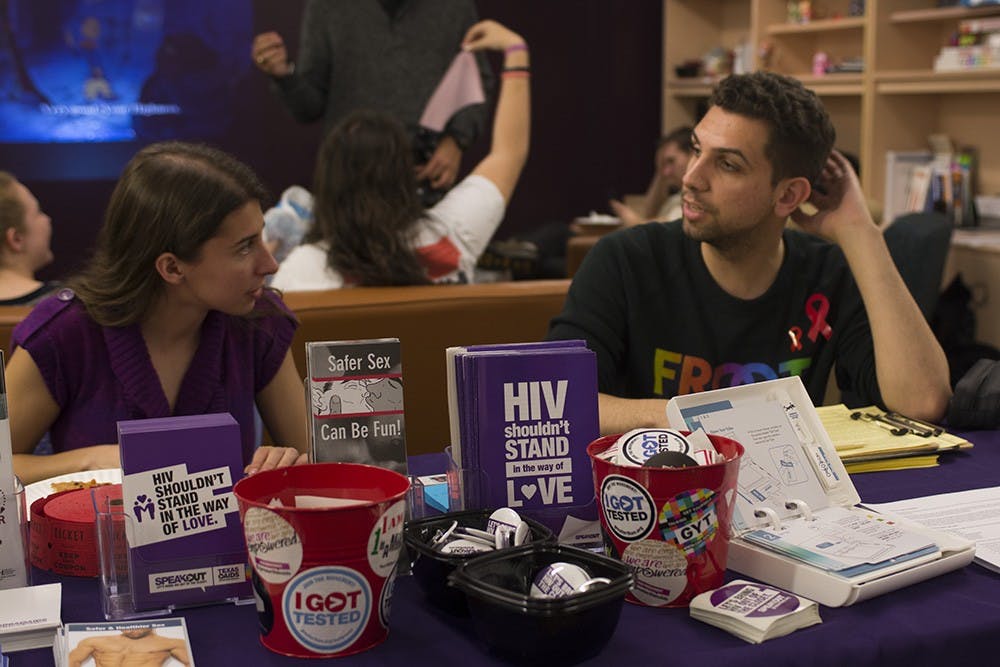Last week, the LGBTQ Center recognized World AIDS Day by hosting free HIV testing clinic. World AIDS Day, started by the World Health Organization in 1988, gives people the opportunity to learn more about HIV and AIDS and fosters support for the fight against these illnesses. According to worldaidsday.org, there are an estimated 34 million people currently living with the virus and over 35 million people have died of HIV or AIDS since 1984.
Other organizations involved in fighting against HIV and AIDS joined the LGBTQ Center for the event. These groups included the Virginia Department of Health, Student Council, Black Student Alliance, Student Global AIDS Campaign, University Peer Health Educators and the Zeta Eta Chapter of Phi Beta Sigma fraternity.
Second-year College student Sindhura Elagandhala, health intern at the LGBTQ Center, said the Center had other organizations join because all of the groups share a common goal.
“We really wanted to acknowledge the plurality of populations and demographics that are affected by this,” Elagandhala said. “And also, we wanted to acknowledge the intersectionality.”
Fourth-year College student Darius Weaver, vice president of the Zeta Eta Chapter of Phi Beta Sigma fraternity, said his fraternity became involved with the event to spread awareness about how the virus affects the black community.
“Our involvement with [the event was] mostly because it affects black communities and it’s something that a lot of people don’t pay attention to like they should,” Weaver said. “So we just want to bring that awareness out to the community and also give a free testing clinic so that they have the opportunity to know their status, because that’s the next step to ending the epidemic.”
The Student Global AIDS Campaign had a table at the event where students could write down and share what made them decide to get tested. Third-year Nursing student Ashley Belfort, president of the campaign, took pictures of students who wrote down their reasons for getting tested.
“I think it’s really important for people to know whether or not they have an STD just so that they don’t infect other people, for one, and so they can seek treatment themselves,” Belfort said. “With HIV, the symptoms are not really noticeable. You don’t really know until the disease has progressed to a stage that [is] really difficult to treat. It’s already difficult to treat, so if you know early on you have a better chance of survival.”
Fourth-year College student Connor Roessler, a LGBTQ programs intern and Peer Health Educator, explained why this event was a great resource for college students.
“I think a lot of college students find this weird transitional period where they might start wanting to get tested, like they’re starting to be sexually active away from home and they’re not really sure how insurance works, how Student Health works,” Roessler said,” and so providing some free testing is a really good opportunity for them to kind of learn about those resources and learn good information about safe sex because they’re not necessarily getting that at a lot of other places.”
The HIV and AIDS epidemic has a troubling history, especially within the LGBTQ community. The virus used to be referred to as “gay cancer” and was ignored by several presidential administrations, making it an important issue for the LGBTQ community. Elagandhala shared ways to have safe, protective sex at the event and described this troubling history.
“The AIDS crisis was a big thing in the LGBTQ population and community,” Elagandhala said. “And there’s still people alive today that lived through it. So people above 50, for example, if you have a conversation with them and you talk to them and you ask them about AIDS and the AIDS crisis, they often get this glazed look over their face. A lot of people don’t like talking about it because it’s a memory of basically all of their friends dying.”
Even though there is still a long way to go, the fight has seen significant improvements, Elagandhala said.
“It’s just, for us to be putting this on, it was really important that we show [people] this was really historically based,” Elagandhala said. “It made a huge dent in this population. But there is a lot of things that are changing and there’s a lot of hope. This isn’t necessarily a death sentence.”
The free testing event helped increase conversation about the virus among University students and made it possible for students to get tested in a comfortable setting. Weaver gave advice for students who are worried about getting tested.
“I would recommend bringing in a friend or telling your family that you’re doing this or telling a friend that you need support because it just eases the anxiety of it, and, you know, [if] you both get tested, you both know and that way you have someone to lean on if it is something that’s a problem,” Weaver said. “Either way, whether you don’t know or you do know is going to affect you and the community that you’re in as well as your friends and family, so just do it together.”







